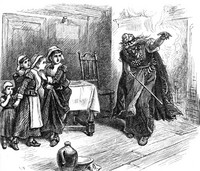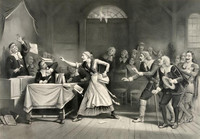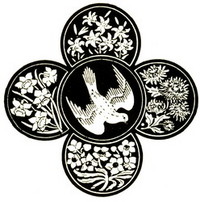FAQ & Salem Witch Hysteria
Was your church involved in the witch hysteria of Salem Village in 1692?
Yes, but the tragic series of events actually began in Danvers. The First Church in Salem was one of two churches directly involved with the Witch Trials. The church where the hysteria began was the Church of Salem Village, which had split off from the First Church in Salem in 1678. Salem Village was located four miles inland in what is now the town of Danvers and the Salem Village parish is now the First Congregational Church of Danvers.
As we like to tell people, while the witch hysteria began in Danvers, it was finished here in Salem. Two of our full members were excommunicated and executed in the ensuing events of that year, Giles Corey and Rebecca Nurse. In addition, many members of our church participated in and supported the witch-hunt that quickly consumed the entire area. Many of these people later recanted and publicly apologized.
What is your view of the witchcraft hysteria?
There were no real witches executed in 1692. There were only innocent women and men falsely accused in a mass hysteria that underneath had as much to do with personal vendettas, grudges and greedy land grabs. The real evil that existed in Salem did not reside in the 136 people who were imprisoned and the 20 more who were executed. Rather it lay in the religious fervor of the accusers and judges who believed that what they were doing was righteous and holy.
In addition, it should be pointed out that the Salem Witch Hysteria was part of a larger phenomenon that had wracked Europe from 1450 through 1700. While the hysteria of Salem has become the most infamous, it should be pointed out that witch hysterias broke out all over Europe during this period of time, with the largest number occurring in Scotland. Indeed, the most popular book in Europe – other than the Bible – during this period was a volume titled Malleus Maleficarum (The Hammer of Witches), first published by two Dominican monks (and Inquisitors) in 1486. This work, characterized by a distinct anti-feminine tenor, vividly describes the satanic and sexual abominations of witches. The book was translated into many languages and went through many editions in both Catholic and Protestant countries, outselling all other books except the Bible. Thus, to understand the larger context for witch hunts involves being aware of the extreme anxiety and tensions that existed across Europe and later the English Colonies and to heed the human impulse to scapegoat the other during times of social turmoil and conflict.
How did the events of 1692 affect your church in the succeeding decades and centuries?
Over time, it became clear that we learned from the Witch hysteria. This church did in part respond with an apology and a confession. In the years following 1692, this church slowly transformed into a liberal Christian religious community that espoused at its best moments the classic liberal values of religious freedom, using reason in the interpretation of scripture, and - above all – practicing religious tolerance.
Ours has been a slow progression towards open mindedness and compassion that has been marked with many distinguished personalities along the way. In a sense, we here in Salem have learned through our long history that the measure of any religious tradition must be – has to be – the effects it has on those who follow it. We have learned that God gave us minds and the use of reason for a purpose and all authentic followers of a religious path should test their teachings and come to terms with those aspects which do not lead people to being more kind and more loving in this world.
A couple of years ago, Rabbi Moshe Waldoks, of Temple Beth Zion in Brookline, wrote in an op-ed piece in the Boston Globe that “the purpose of religion is to create and maintain compassionate people. It is through compassion that we prosper,” he writes. “In the absence of compassion, we flounder.”
In a sense the ultimate goal of religion is instilling and fostering compassion among people. That is what religion does when it is truly serving its function in the world
How do the events of 1692 effect your church today?
The legacy of our involvement affects how we view our mission and community outreach. We have found that if we really want to make amends for those who lost their lives in 1692, we need to work in the here and now to find justice for those who are falsely accused and persecuted today. We can do nothing to erase the tragic past that involved our church. We can look for those who are suffering now to try to address these wrongs.
There is a well-known saying that states that the true goal of Christianity is not to get humanity into heaven but to get heaven into humanity. We believe this to be true. While we know that there are others who disagree with us, we believe that our Christian faith is best evidenced by deeds not creeds. We recognize the presence of Jesus not in the promulgation of correct doctrine but in the very actions of our lives.
What is Unitarian Universalism and what are its origins?
Unitarian and Universalist churches were founded upon the ethical and spiritual ideals of Protestant Christianity, with theological roots in the early Christianity of the first millennium.
The word “universalism” originally meant a belief in or theology of universal salvation, or the eventual salvation of all, and a denial of the concept of “eternal damnation.” The term “unitarian” originally meant belief that God is a singular “Unity,” in opposition to the notion of the “Trinity,” or God as three persons, which was not developed by the Church until the fourth century.
Our tradition evolved as nonconforming movements within Christianity, dissenting from the doctrines and dogma of the established church, and appealing to individual freedom and reason, with a focus on the life and message of Jesus, rather than speculation about his cosmic nature.
What is your view of the Bible?
We believe that being a Christian doesn’t mean that you have to accept a literal interpretation of the Bible and a narrow minded ideology.
Indeed there are many vital and loving congregations where a plurality of viewpoints about issues of theology peacefully coexist. And there are many vital and thoughtful congregations that combine authentic faith with a reasoned and informed understanding of what the Bible is and what it is not.
We believe that the scriptures are best seen as a map. They are a record of travel that shows a history of humanity’s relationship with the divine. We do not believe that the Bible is a literal instruction manual. It is a collection of human writings inspired by God. When we use it, study it and wrestle with its meaning, we discover our own religious path to being more loving people and to serving God.
What is your opinion about other forms of christianity?
The First Church in Salem has a long history of welcoming many differing religious communities to Salem. We have long tried to encourage religious tolerance and interfaith understanding.
We assert that there are alternative Christian perspectives that do not carry the baggage of exclusivism, prejudice, and rigid dogma that many people in this country who don’t go to church have come to associate with the Christian religion.
For ourselves, we do not believe that everyone has to have had a born-again experience in order to be a Christian. We believe that the way we treat one another and other people is more important than the way we express our beliefs and encounter God.
We believe there is ample evidence in the Bible that true religion is manifested in our behavior and in our lives – and not exclusively in subjective reports of personal transformation.
Those experiences are all well and good and we affirm that they are many times real. However, Jesus said that you will know those who serve him by the fruit of their actions – not the theological rigor and emotion of their professions.
How is your church governed?
The First Church in Salem is the original congregational church founded in North America. We have been self governing since our inception in 1629. We do not believe that being a Christian means that you must submit to an antiquated and hierarchical power structure.
Indeed, there have been churches that have governed themselves through a democratic process for hundreds of years (like this one).
While we acknowledge that with local power comes local responsibility, we believe that like minded individuals gathering in the quest for truth and the spirit of Jesus are best served by democratic and egalitarian governance.
Sometimes God moves in the urgings of individual conscience and the interchanges of debate.
When do you meet for Church?
We meet for our weekly religious service on Sundays at 10:30 AM.
We have an active Sunday school program and provide childcare each week.
All people and all ages are welcome!




